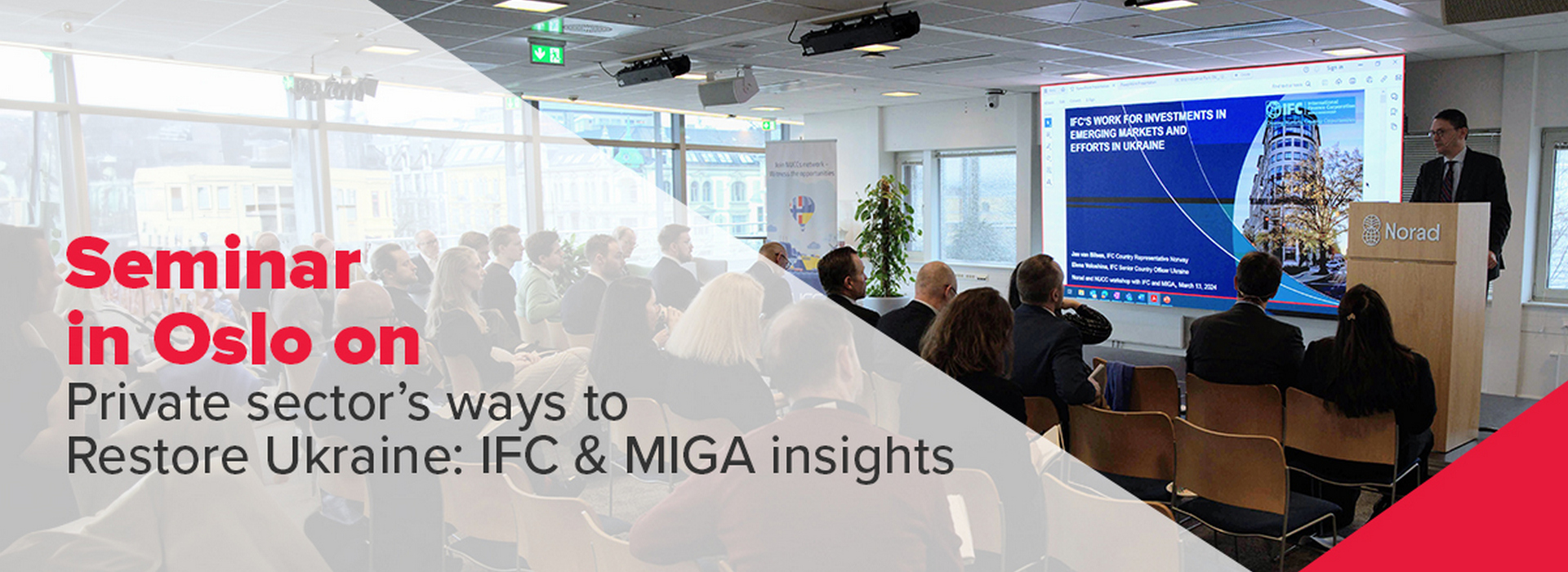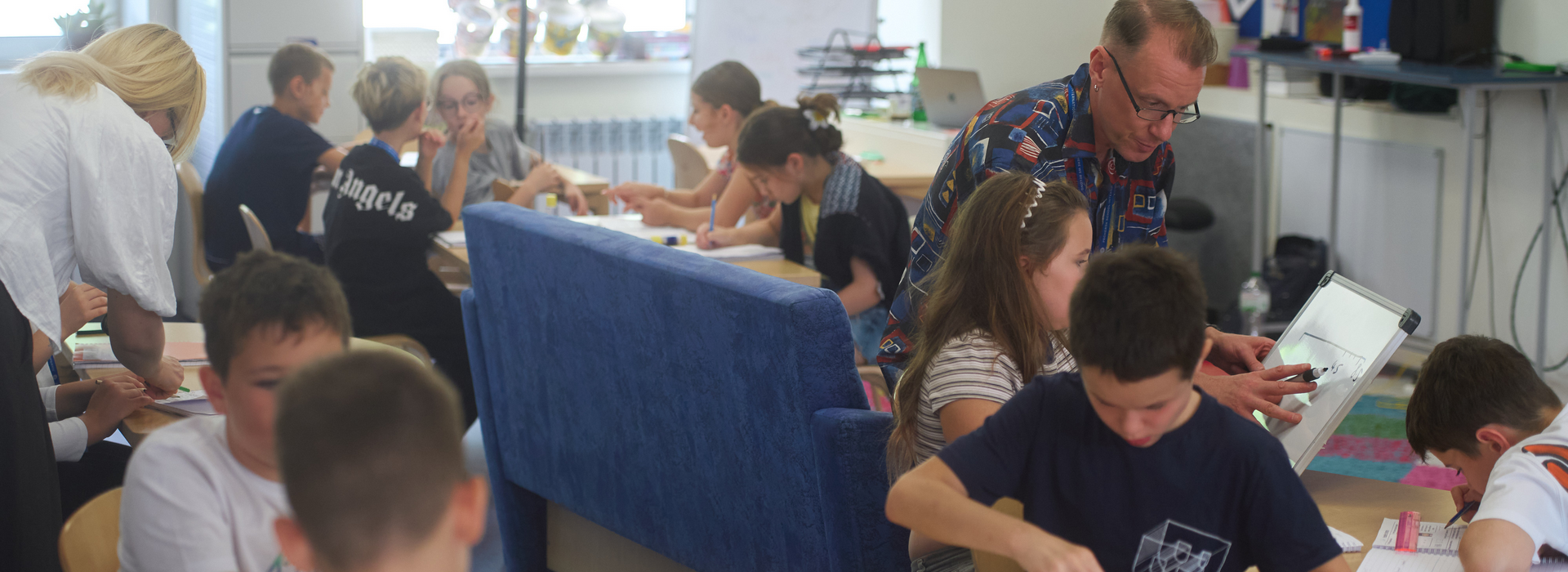As the full-scale war in Ukraine enters the two-year mark, the country’s recovery and reconstruction must grow. To address such needs Ukraine requires both a competitive economy and an active private sector to support the state’s recovery and reconstruction efforts.
That’s why on March 13, 2024, in Oslo, Norway, leaders and experts convened the seminar “How to boost the private sector for the reconstruction of Ukraine? Understanding IFC and MIGA’s financial toolkits” aimed to explore strategies for engaging the private sector in Ukraine’s recovery efforts. Among the participants was Vira Savchenko, the CEO of BDO in Ukraine, and a Member of the Board of the Ukraine Recovery Committee at the European Business Association (EBA).
The event started with a brief presentation on the challenges and opportunities for the private sector in reconstructing Ukraine after the war by Anna Derevianko — an Executive Director at the European Business Association and a Co-founder at Global Business for Ukraine.
Anna quoted the World Bank’s estimation of USD 486 billion as the total amount for recovery purposes and the Kyiv School of Economics’ estimation of USD 155 billion as the direct damage caused by the war. She also mentioned platforms and programs showcasing the investment projects from local authorities and businesses. For example, the Dream Platform is an ecosystem designed to present investment projects from local authorities currently with 2,300 projects from various communities, Investment Map of Ukraine currently has 144 investment projects from businesses and local authorities with the net value of USD 5 billion.
Anna Derevianko also shared some positive indicators of macroeconomic stability and business resilience in Ukraine such as the expected 4% GDP growth with the 8% inflation level, the significant growth in the military industry, the high level of operational and financial performance of EBA’s member-companies, and the strong appetite for lending and investment. The private sector is resilient and optimistic, with 90% of the businesses willing to participate in the recovery and 43% paying bonuses to employees.
She also acknowledged that the uncertainty, the challenges related to employment and labor markets, the issues with logistics and the aggressive approach of the law enforcement institutions are among the main difficulties facing the private sector. However, there are also opportunities in such areas as food processing, construction, infrastructure, energy, military technologies, healthcare and education. Anna encourages transparent business practices and is willing to establish connections between the parties interested and the Ukrainian stakeholders.
In summary, Ukraine is in a dire need of reconstruction, with various stakeholders and platforms working towards the recovery. Ukraine is expected to receive substantial international support and there are opportunities for growth and investment despite the challenges.
The next speaker, Jan van Bilzer, the country manager for the Nordics, Germany, and Switzerland at IFC, spoke about the organization’s operations in Ukraine. IFC, the private sector division of the World Bank Group, has made an exception to finance projects in Ukraine during the war and has approved a USD 2 billion program for additional financing of the Ukrainian private sector. IFC has a broad toolkit of financing options available for projects in Ukraine including equity, loans, guarantees, and currency hedging. The organization provides financing in 70 different currencies to mitigate the currency risk. Jan also mentioned a report that IFC co-authored with the World Bank and the Ukrainian government outlining the private sector opportunities and the reforms needed for a green and resilient recovery of Ukraine.
IFC is willing to discuss each and every opportunity in Ukraine and to establish connections between the interested investors and the relevant counterparties.

Elena Voloshyna, the Head of Operations in Ukraine for IFC, presented the opportunities and challenges for the development of Ukrainian private sector and the role of IFC in supporting it.
According to Elena, the organization invested more than USD 1 billion in Ukrainian private sector in partnership with the European donor governments. The investment is a part of a USD 2 billion program approved by the IFC’s Board to support the private sector in Ukraine representing 70% of the country’s GDP and contributing to at least 30 to 40 percent of exports. IFC’s response to the challenges faced by Ukraine is remarkable, as the organization has never stopped its support for the country. During the first months of the war IFC provided funding to existing clients, supported trade and provided working capital to companies in need.

Highlighting the potential for private sector’s contributions to rebuilding Ukraine Elena noted that between 18 and 30 percent of the recovery needs could be covered by private investments depending on the pace of reforms. The sectors that have the most potential for private sector’s involvement are agriculture, trade, industry, tourism, finance, and banking. It also highlights the need for reforms and the public sector’s interventions in other areas such as energy, transport, health, education, housing, and telecommunications.
The two-phase approach of the IFC’s investment program. The first phase focuses on short-term financing instruments supporting the internally displaced people, exports, imports and critical infrastructure. The second phase is about the reconstruction and recovery and involves preparation for public-private partnerships, as well as the upstream, analytical and advisory works in different sectors. IFC’s support for Ukrainian private sector is ongoing with a healthy pipeline in agriculture, finance, industry, telecoms, energy and transport.

Elena Voloshyna emphasizes that it’s critical to support trade flows and that IFC is supporting both exports and imports through its global trade facilitation program.
Yann Goutin, the Head of Western Europe for MIGA, the guarantee agency of the World Bank Group, resumed the seminar and introduced MIGA’s products and activities in Ukraine explaining how they can help investors and lenders in emerging markets. MIGA has grown rapidly over the years and has a goal of issuing USD 20 billion of guarantees each year by 2030. The organization works with the private sector and reinsures two-thirds of its insurance with the private market. It also engages trust funds from donor governments, such as Norway, to support investments in fragile countries like Ukraine.
Yann told that MIGA provides political risk insurance to protect investors and lenders from risks, such as: currency inconvertibility, expropriation, war, civil disturbance and breach of contract. It also offers trade finance guarantees to facilitate trade flows and access to finance within challenging markets. The organization supports all sectors of economy, especially infrastructure, manufacturing, services, and financing. It covers investments in various regions of Ukraine including the conflict-affected areas. MIGA has issued about USD 200 million of investment in Ukraine since the beginning of the war in 2014.

MIGA covers investors’ equity, shareholder loans and debt, and lenders’ loans and trade finance. It can provide long-term coverage for up to 20 years and allow investors to cancel the coverage at any moment. It follows the same environmental and social standards as the IFC and helps to resolve disputes with the government.
At the end of his presentation Yann Goutin mentioned that MIGA has supported the equity investment of Dragon Capital, a Ukrainian investment company, for a M10 Lviv Industrial Park. It provided war and civil disturbance coverage for 10 years and used the trust fund from Norway to reduce the cost of the premium. The project is expected to create jobs and attract foreign direct investment.
During the seminar Vira Savchenko asked about practical steps that could be advised for a Norwegian investor who wanted to invest up to 8 million euros in Ukraine. Jan van Bilzer from IFC answered that the investor should approach IFC and MIGA directly and provide information about the investment, the business case and the business plan. He said that IFC and MIGA are willing to discuss any opportunity in Ukraine, regardless of the size and to help with advice, financing, and risk mitigation. He also suggested that the investor should talk to the embassy and decide on consultants’ engagement.
We are thankful to our partner, the Norwegian-Ukrainian Chamber of Commerce, for inviting us to this very substantial event. The seminar was concluded with a strong call to action, urging the international community and private sector stakeholders to capitalize on the presented opportunities and financial mechanisms. Ukraine continues its fight for freedom but at the same time has already started the recovery process. The collaborative efforts of IFC, MIGA, governmental agencies, and private investors remain pivotal in unlocking the potential for a resilient and prosperous future for Ukraine.
For more details on discovering business opportunities in Ukraine, please visit the Investor’s Guide page.



























